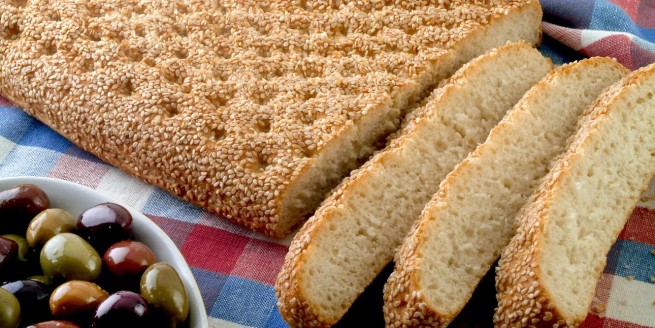On Clean Monday (March 18), 650 bakers in Thessaloniki prefecture will bake more than 500,000 flatbreads of Lenten bread – lagana. At the same time, the price will remain at last year’s level, that is, from 2.50 to 2.60 euros per piece.
This is indicated by the President of the Thessaloniki Bakers Association “Ο Προφήτης Ηλίας” Elsa Koukumeria, Vice-President of the Hellenic Bakers Federation.
“90% of consumers vote for traditional lagana,” she emphasizes, and clarifies that “of course, there are those who want it with “stuffing” – olives, peppers and mushrooms. This year they will again be sold at last year’s price from 3 to 3.20 euros/piece,” the official notes characteristically.
The bakers of Thessaloniki prefecture increased the price of lagana for the first time in 2019, having previously kept it unchanged for eleven years, and a second increase of about 7% followed in 2023, with the result that, as Ms. Koukumeria recalls, last year’s prices raw materials increased by 50%, but also energy.
Optimistic about customer demand
Regarding bakers’ expectations regarding bakery traffic on Clean Monday, the president of Ο Προφήτης Ηλίας was optimistic, noting: “In the morning, Greeks will definitely go to the neighboring bakery to buy at least one hot flatbread. We, the people of Greece, remain true to our traditions.” .
In this context, she expresses satisfaction and gratitude for the trust that consumers have placed in bakers and supported them over the past three years. The official emphasizes that the majority of citizens have now become “loyal” to traditional bakeries.
“Citizens are now suspicious consumers and, being more educated, but also restrained in their purchases, they “vote” for their neighborhood stores“,” she notes characteristically and adds that “citizens fully understand (and accept) any price increases that we are forced to do from time to time. We know the “pain” of society and the financial difficulties that exist for all of us,” he adds.
Ms. Cucumeria notes that preparing traditional lagana by hand is a labor-intensive 12-hour process, and on Clean Monday, each oven will have to run from 9:00 pm on Sunday evening until 3:00 pm the next day to meet demand (up to 700 pieces average consumption per store) . This, she says, makes it clear that the baker must pay triple the workers’ daily wages, “while the baker’s profit margin is now zero.”
The traditional custom of baking lagana plays a leading role in the Clean Monday fasting table. Lagana is unleavened bread, that is, prepared without leaven, and, apparently, it was eaten by the Israelites on the night of their exodus from Egypt under the leadership of Moses. From then on, the Mosaic Law applied it on all Passover days until Christ blessed leavened bread.
The history of lagana runs through the entire food tradition from ancient times to the present day. Aristophanes in Ecclesiastes says that “the lagana is scattered (quickly eaten),” and Horace in his texts mentions the lagana as “the delight of the poor.”
The custom of lagana has remained unchanged for centuries and is traditionally and lovingly prepared by the local baker. Crispy bread with sesame seeds is eaten on Clean Monday, the first Monday of Lent.
As for the reason why this particular Monday is called “Clean”, they say that the name comes from the habit of housewives in the morning of this day to wash all kitchen utensils with hot water and ash, considering it a day of “cleansing”.







More Stories
Greece: growth in deposits from households and businesses in March 2024
How much will it cost a Greek family to celebrate Easter?
EU employment record: Greece "stuck" in a low position